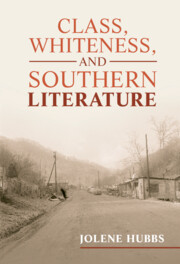Book contents
- Class, Whiteness, and Southern Literature
- Cambridge Studies in American Literature and Culture
- Class, Whiteness, and Southern Literature
- Copyright page
- Contents
- Figures
- Acknowledgments
- Introduction
- Chapter 1 Riffraff and Half-Strainers
- Chapter 2 Slow, Sweating, Stinking Bumpkins
- Chapter 3 Civil Rights and Uncivil Whites
- Chapter 4 Hungry Women and Horny Men
- Coda
- Notes
- Bibliography
- Index
- Recent books in this series (continued from page ii)
Introduction
Poor White Southerners in the American Imaginary
Published online by Cambridge University Press: 01 December 2022
- Class, Whiteness, and Southern Literature
- Cambridge Studies in American Literature and Culture
- Class, Whiteness, and Southern Literature
- Copyright page
- Contents
- Figures
- Acknowledgments
- Introduction
- Chapter 1 Riffraff and Half-Strainers
- Chapter 2 Slow, Sweating, Stinking Bumpkins
- Chapter 3 Civil Rights and Uncivil Whites
- Chapter 4 Hungry Women and Horny Men
- Coda
- Notes
- Bibliography
- Index
- Recent books in this series (continued from page ii)
Summary
In the introduction, I analyze visual artists’ depictions of poor white people that were produced in the 1890s and the 1930s—periods of economic depression—in order to make the case that representations of poor white southerners often serve as barometers of the cultural anxieties gripping members of the middle class. Works by two American artists—E. W. Kemble, an illustrator best known for the drawings he produced for the first edition of Adventures of Huckleberry Finn, and Walker Evans, a photographer who collaborated with James Agee on Let Us Now Praise Famous Men—illustrate how unflattering depictions of poor whites act as foils for higher-status white people’s desired self-conceptions. This analysis models the methodology I use throughout this study by establishing how representations of poor white southerners can serve as windows onto the middle-class (and occasionally upper-class) people who create and consume them.
- Type
- Chapter
- Information
- Class, Whiteness, and Southern Literature , pp. 1 - 18Publisher: Cambridge University PressPrint publication year: 2022

